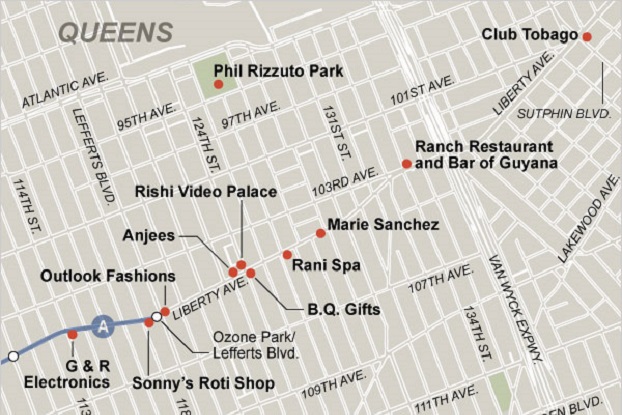
As Americans prepared to commemorate Columbus discovering the New World this October, a travel writer from the Washington Post fell asleep on the A train and accidentally discovered Indo-Caribbean people in Queens, New York.
The author, rustled from sleep with the notification of landing in Richmond Hill (colloquially known as “Little Guyana”), arrives spellbound by cheap island treats, the presence of machete-wielding locals, and our “wild” music.
“Nobody told me about Little Guyana, a mile-plus-long stretch in the Richmond Hill neighborhood of Queens where the residents are Indian but sound like Bob Marley when they speak.”
Fortunately for the author, the audacity to express not knowing an entire race of people exists is not confined to the shortsightedness of poorly written and insulting travel pieces “discovering” marginalized communities.
“Actually, [before I met you/moved to New York City/<insert oblivious yet offensive comment of choice here>], I didn’t know Indo-Caribbean people existed,” is more common than you might think.
I have lost count of the number of times individuals — white people and people of color alike, including South Asians — [pullquote]I have lost count of the number of times individuals — white people and people of color alike, including South Asians — say they never knew Indo-Caribbean people “existed.”[/pullquote]say they never knew Indo-Caribbean people “existed.” Growing up as Indo-Caribbean in America, the question of, “What are you?” unfailingly warrants an unsolicited lesson in the history of Western colonialism. For people of color in America that seem to not visibly fit into race categories assigned to Census boxes, the frustration accompanying this question is common. Yet unlike other elementary school aged children who do not learn about residual systems of slavery and colonialism until middle-school, many of us have an idea about the system of indentureship that brought our ancestors from India to the Caribbean and recite from memory the history lesson our parents inculcated to other kids at recess with blank looks on their faces.
When people say they do not know we “existed,” essentially what they mean is we must be variegated ethnic unicorns appearing as glorious exceptions to dominant American narratives where other cultures and people inevitably are allowed to exist (no history lesson required).
If the individual is feeling particularly apologetic about not knowing about the existence of Indo-Caribbean communities, they will assume the quiet tone of confession, a revelation made in atonement for their lack of knowledge due to intentional historical omissions from subcontinental and American textbooks alike, privileging majority vs. minority politics, and perpetuating our ancestral struggles to footnotes within the domination of British and Western imperialism.
If they are oblivious to the project of white supremacy and the historical distancing of India from the violence of indentureship that allows individuals to say they never knew an entire race of people “existed,” they will write articles like the one published in the Washington Post.
The author, who never knew Indo-Caribbean people “existed,” also assumes:”It’s probably safe to say that many, if not most, Americans know little or nothing about Guyana” — Is that safe to say? Why would that be safe to say? Are there also no Guyanese-Americans who do not know their own race exists? Do Guyanese-Americans not exist, or is the assumption that Guyanese-Americans are not “many” or “most” Americans?
Strolling down the community hub of Liberty Avenue, the author states, “Urban grit is rife, but there’s no real danger.” I’m not sure whether the author believes our little chutney-blasting, carnival enclave must be a microcosm of island paradise, but as a founding member of Jahajee Sisters, I know that our organization was created following the violent deaths of two young Indo-Caribbean women, and as a direct response to the devastating rates of domestic and gender-based violence impacting the Indo-Caribbean community.
The author’s exoticizing account of Indo-Caribbean people stops short as the machete-wielding coconut man requested by the author for a photograph declines the request. But this does not deter the author from observing us National Geographic-style, commenting on local women outfitted in “Western garb.”
The idea that Guyanese communities do not exist invites many, many more assumptions, least of which is the fact that Caribbean communities are not an integral part of the fabric of American identity. America is here, Guyana is over there, and clearly you cannot be Guyanese and American (since clearly “American” identity is a code-word for “white”).
The issue is not simply the lack of knowledge about the existence of Indo-Caribbean people, but the audacity to inherently otherize communities that cannot easily be filed away into dominant race boxes. The issue is approaching this lack of knowledge with humility, rather than from a vantage point of dominant “American” narratives which continue to otherize already marginalized populations whose histories continue to be excised from the chapters of history.
The project of visibility is always a complex one; many [pullquote align=”right”]The project of visibility is always a complex one.[/pullquote]responses to this article — including responses by Indo-Caribbean individuals and organizations — hail the Washington Post for our nugget of acknowledgement which validates our community and the very notion that we exist.
But we must refuse the idea that submitting to concessions for the sake of visibility and validation of the existence of our community comes at the expense of perpetuating stereotypes and inaccurate, reductionist portrayals. As our community continues to be impacted by the silencing of our histories, our narratives, and our people, we must resist the collisions of post-colonialism, white supremacy, and the historical distancing of indentureship from South Asian narratives that perpetuate these systems of power and privilege that continue to allow us to not “exist.”
Suzanne Persard is a writer and activist from New York City who is a founding member of Jahajee Sisters, the first Indo-Caribbean women’s organization in the country committed to ending gender-based violence.












